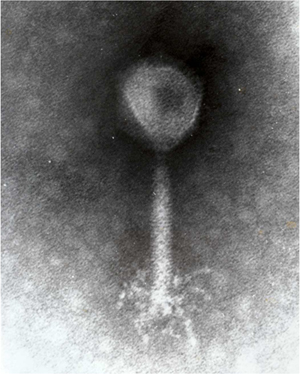Research on Host-Takeover during Bacteriophage Infection:

Electron micrograph of bacteriophage SPO1. Courtesy of Dr. Hans-Wolfgang Ackermann.
|
When Bacillus subtilis is infected by bacteriophage SPO1, the phage directs the remodeling of the host cell,
converting it from a factory for its own reproduction into a factory for reproduction of phage.
The host's biosynthetic machinery is subverted to the purposes of the phage. Most or all synthesis of
host DNA, RNA, and protein is shut off, presumably to prevent those syntheses from competing with the corresponding
phage biosyntheses for materials, energy, and access to biosynthetic machinery. Such global redirection of the cell's
resources requires regulatory mechanisms of great sophistication and specificity, to eliminate the host-specific
biosyntheses, while exactly the same processes, specific to the phage genome, proceed with great efficiency in the
same cell. Our objective is to elucidate those regulatory mechanisms.
This host-takeover is accomplished primarily by the products of SPO1 genes 37-60, the "Host-Takeover Module"
(6).
Wherever I have underlined a reference, that is one of my papers, and this should be a
link to that paper. The following links summarize the known activities of those individual gene products:
A. General Introduction to bacteriophage SPO1.
B. GP44, gp50, and gp51 regulate the shutoff of host biosyntheses indirectly, by regulating expression of the genes of the host-takeover module.
C. GP40 plays a direct role in shutoff of both host DNA and RNA synthesis, and gp38 and gp39 regulate both shutoffs, by direct participation in the shutoff processes.
D. GP56 (possibly assisted by gp57 and gp58) inhibits host cell division.
E. GP55-53 may inhibit host protein synthesis.
F. Antibiotic Activities of SPO1 Proteins.
References

